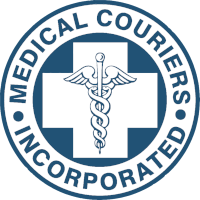As a medical courier service, we know our drivers are in physicians’ offices more than our client’s sales reps. So we know how important it is that they represent our clients well. We are constantly asking ourselves how to make this medical courier service tag team as seamless as possible so our drivers essentially function as an extension of our client’s brand in the field. Here’s what rises to the top.
40+ Hours of Training
Medical courier service activities require precision and awareness on the part of the driver. They are not just transporting an object from point A to point B; they are affecting patient care every time they touch a bag or a box. Training comes down to the details.
Keeping medical specimens at the correct temperature with infrared temperature monitors, tracking them throughout the journey with cloud-enabled GPS trackers, and ensuring they are delivered within their stability window are all steps in the 40+ hours of training our medical courier service drivers must pass before they can hit the road.
And it’s not just the initial training we focus on. Our ongoing medical courier service driver training reinforces our client’s protocols so they become second nature.
Taking the baton in the last lap is a lot of responsibility, and we take it seriously—our drivers take it seriously too. But representing clients in the field isn’t just about medical courier service protocols.
8 Point Driver Checklist
We know our clients don’t necessarily like working with medical courier service companies because they feel “out of control”. They want to be represented by a professional, communicative, friendly extension of their brand in the field. That’s why we’ve created an 8 Point Driver Checklist so our drivers can confidently walk into labs, doctor’s offices, and hospitals and represent our clients well. Why is this so important?
Imagine doing all the legwork to set up a relationship with a new customer, then having to hand that customer off to a medical courier service whose drivers look untidy, and don’t smile or say hello. Your customer would feel the disconnect, the lack of brand continuity, and your business could suffer.
Professionalism is key in our driver’s playbooks. That means they don’t wear shorts; they wear badges. Their shirts are ironed, and their cars are clean. And we believe training isn’t always about professionalism—sometimes it’s about awareness.

C.A.R.E. Training
We train our medical courier service drivers to check and double check, be proactive, and communicate with the labs in the field if something doesn’t feel right. We train our drivers to CARE as much as you do, and we’ve developed signature C.A.R.E. Training with this principle at its core.
C.A.R.E. Training (Compassionate And Respectful Employees) was designed to convey to our drivers that these deliveries are more than just bottles and bags; they are human beings waiting for results that will affect their lives.
C.A.R.E. helps our drivers see the story behind each specimen so they feel connected to the patients. It helps them understand their critical role in that individual’s journey to health, and therefore reduces the chance for human error.
Because our drivers understand how important their role is, they take pride in doing their job right. They feel part of something larger than themselves—they know they are one stop on a patient’s road to health. They care.
When clients can’t be there, they want a medical courier service they can trust—it’s not just another box. That’s why we believe supporting our client’s relationships and keeping them strong is important, and it has become the foundation for all our driver training. This is what it means to us to represent our clients in the field.











